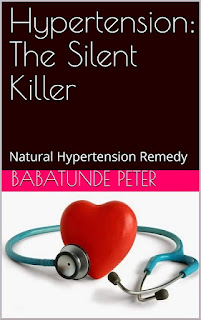Hypertension is the medical term for high blood pressure. It is dangerous because it makes the heart work too hard and contributes to atherosclerosis (hardening of arteries), besides increasing the risk of heart disease and stroke. Hypertension can also lead to other conditions such as congestive heart failure, kidney disease, and blindness.
What is Hypertension?
Hypertension or high blood pressure (HBP) is a chronic medical condition in which the blood pressure in the arteries is elevated. Blood is carried from the heart to all parts of the body in the vessels. Each time the heartbeats, it pumps blood into the vessels. Blood pressure is determined both by the amount of blood your heart pumps and the amount of resistance to blood flow in your arteries. The more blood your heart pumps and the narrower your arteries, the higher your blood pressure.
Hypertension is disclosed as the "silent killer" for its absence of symptoms detected by the afflicted person. The condition may go unnoticed for years, with few if any signs of discomfort. Long-term high blood pressure, however, is a major risk factor for coronary artery disease, stroke, heart failure, atrial fibrillation, peripheral arterial disease, vision loss, chronic kidney disease, and dementia.
Causes of Hypertension
According to health guidelines, when the blood pressure is more than 130/80 mmHg, the person is prone to hypertension or high blood pressure. Although hypertension can affect any part of the body at any time, it causes the most damage to the heart.
Some of the main causes of Hypertension are:
- Excess consumption of alcohol
- Eat more salt
- Lack of exercise
- Lack of fruits & vegetables in the diet
- Excess coffee-tea intake
- Smoking
- Excessive anger
- Being tense
- Excess intake of Oily, unhealthy & non-vegetable.
Symptoms of Hypertension
- Severe headache (Back of the head and neck pain)
- Fatigue
- Blurred vision
- Pain in chest
- Breathing Difficulties
- Dizziness
- Vomiting or nausea
- Shortness of breath
- Blood in urine
- Many times there is a problem of increased heartbeat with no sleep at night.
How to Control Hypertension (Remedies)
- Hypertension often increases with weight gain. Apart from this, if you are overweight, breathing problems also occur while sleeping, which is also known as sleep apnea. It works to promote hypertension. Weight loss is the most effective way of controlling hypertension. In this case, reduce your weight by exercising.
- Exercise 30 to 60 minutes a day. It also improves mood. It also reduces the risk of diabetes and other types of heart diseases. Exercise is also helpful in a group of Autoimmune diseases.
- Improve the diet to reduce hypertension. Eat fruits, vegetables, and whole grains. Take Low Fat Dairy Products. In addition, eat lean meats, fish,h, and nuts. You should avoid foods that are high in saturated fat like processed food, full-fat dairy product,s, etc.
- Minimal sodium intake is important to reduce hypertension. By eating more sodium, the body starts making fluid. This results in a sharp rise in blood pressure.
- Excessive alcohol consumption can cause a number of health problems including high blood pressure. In addition, excessive drinking may also reduce the effectiveness of some blood pressure medications.
- Stress also increases hypertension. This may temporarily increase blood pressure. It is important to get away from daily responsibilities so that you can reduce stress.
- Smoking increases blood pressure or hypertension. Do not smoke, it makes blood pressure high. Quitting smoking may reduce the risk of heart disease.
Conclusion
Due to its lack of symptoms, hypertension can inflict damage before you are even aware you have it, so don't neglect regular blood pressure screenings. Sometimes treating this condition involves medications. Talk to your doctor about the best treatment options for you, which may include medication, lifestyle changes, or alternative treatment.
Click the link below to get/download my book "Hypertension: The Silent Killer " from Amazon store
https://www.amazon.com/dp/B08F4QY51V
x



Comments
Post a Comment